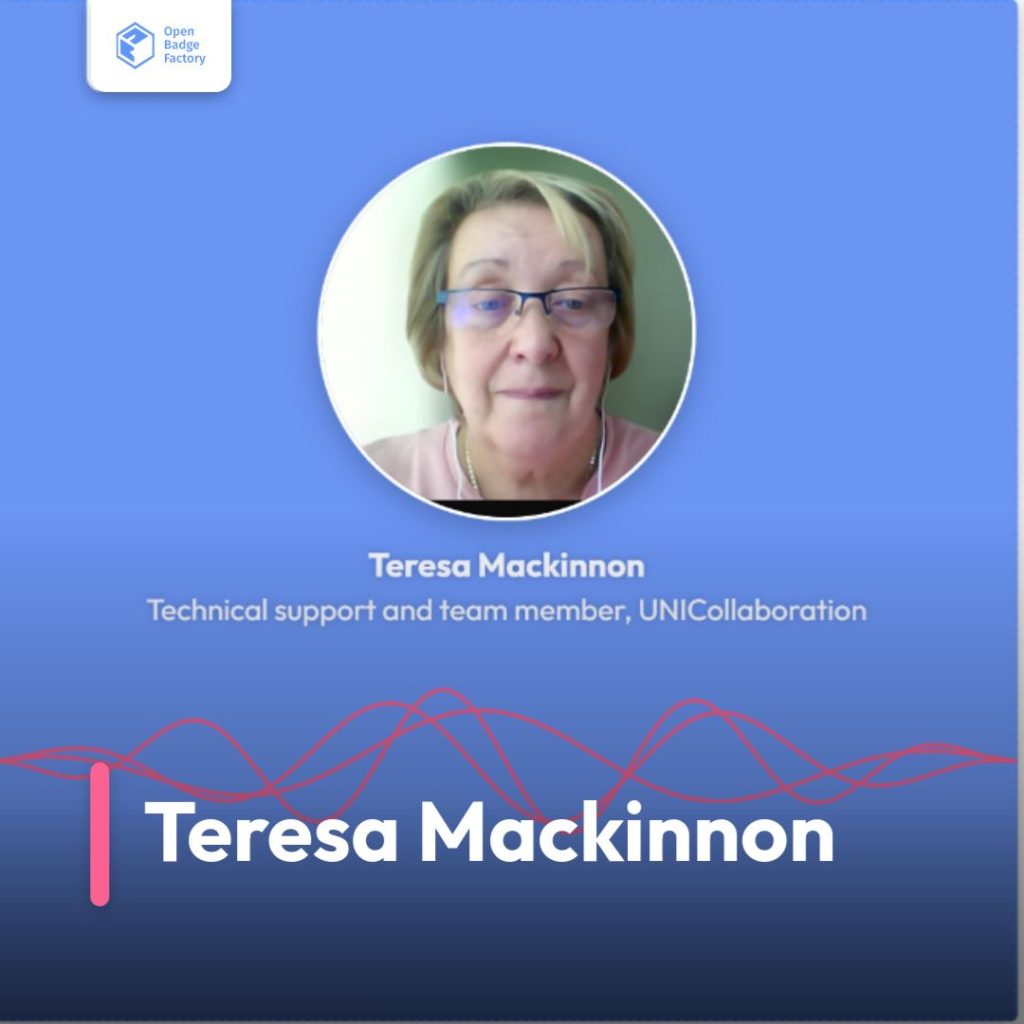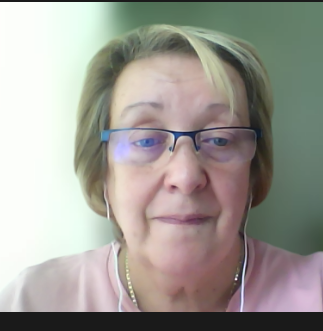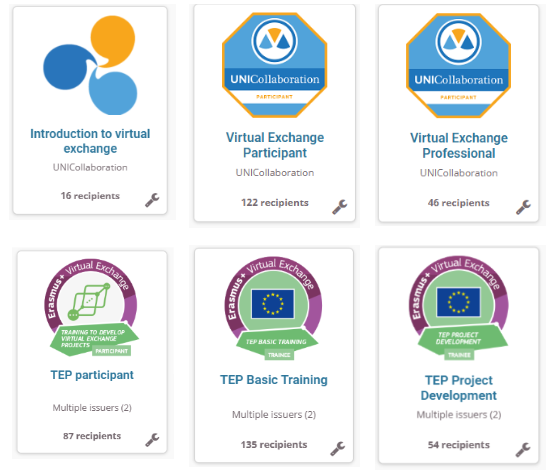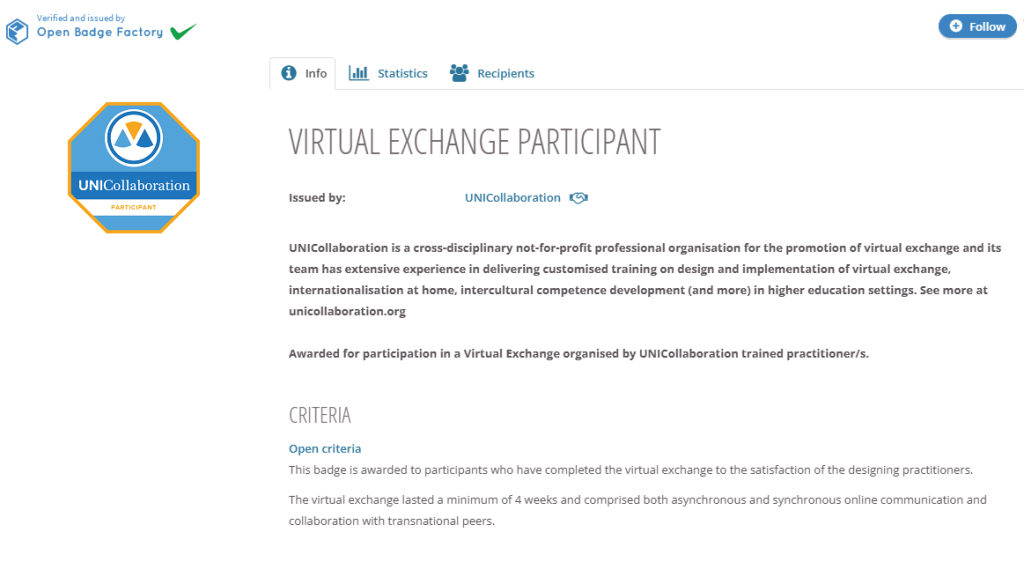At UNICollaboration, Open Badges play a key role in recognizing learning, participation, and collaboration across international virtual exchanges.
Teresa Mackinnon shares how their badge ecosystem helps connect educators and students worldwide, strengthen digital skills, and build global learning communities. Watch Teresa’s story to discover how UNICollaboration uses Open Badges to make virtual exchange more meaningful and inclusive.
If you can’t see the video, please click here to view it on YouTube.
Examples of UNICollaboration badges
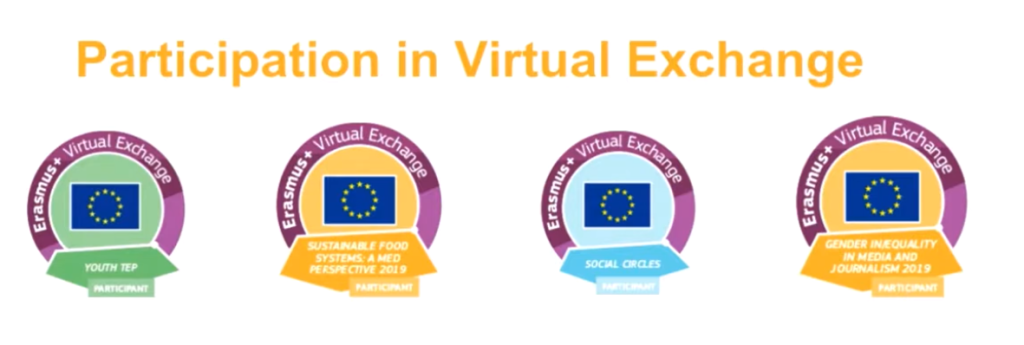
Transcription
Speaker:
Teresa MacKinnon
Technical support and team member, UNICollaboration
Please tell us about yourself
Teresa MacKinnon: Hello, my name is Teresa Mackinnon. I was formerly an Associate Professor at the University of Warwick. Although now retired, I continue to work with UNICollaboration, a not-for-profit organization that supports international collaboration through virtual exchange.
At UNICollaboration, I provide technical support, manage our Moodle platform, develop open badges, and tutor participants in selecting tools for virtual exchange. UNICollaboration is based in Belgium, but our work is entirely online, with team members across Europe. I’m based in the Midlands in the UK.
Why did you choose Open Badges?
Teresa MacKinnon: During my time at the University of Warwick, I managed and collaborated on international virtual exchange projects over a ten-year period. I learned that both students and staff need ongoing motivation and recognition to stay engaged in such programs — it’s a long and sometimes challenging journey.
Badge adoption at UNICollaboration was influenced by our earlier work in the Clavier Virtual Exchange, which was later featured in an academic publication. When the European Virtual Exchange Initiative launched, it gave us the opportunity to create a virtual exchange-based badge ecosystem within UNICollaboration.
This system allowed us to issue open badges at scale. We continue to use open badges because they have proven their value — recognizing participation, progress, and achievement across all levels of virtual exchange, as well as membership in our community.
Open badges give us the visibility, portability, and digital resilience we need. They replace paper certificates with verifiable microcredentials that acknowledge digital interaction skills and learning achievements.
Because open badges are still not equally familiar worldwide, we also focus on supporting adoption. Trainees are introduced to badges during training and can ask questions. We share detailed information through our Recognition page — including downloadable resources in multiple languages and video guides on badge collection and sharing.
Trainers also notify participants before badge emails are sent (since they sometimes end up in spam — another small digital skill to manage!).
Open badges help us create pathways for continued engagement in virtual exchange, leading to new skills and collaborations.
Tell us about your badge system?
Teresa MacKinnon: UNICollaboration offers a variety of badges. Our membership badges are tailored with flexible expiry dates based on each member’s terms.
More importantly, we’ve developed a badge typology, researched and described in collaboration with the Open University. My colleague Mirjam Hauck and I have published this research openly.
We chose Open Badge Factory because it’s the best fit for our needs — and being based in Europe was an important factor. Our members have also embraced Open Badge Passport as a free, easy way to collect, display, and share their badges.
Through Open Badge Factory, we can export reports and statistics that help guide our work. As a non-profit, cost-effectiveness matters to us, and OBF has been a supportive partner throughout our development.
Since 2020, UNICollaboration has issued over 1,800 badges. Our most popular badge is the Participant Badge, awarded to students and staff who take part in our webinars or face-to-face events.
We can clearly demonstrate the criteria each participant meets, and recipients frequently share their badges:
Over 65% are shared on LinkedIn,
Others add them to email signatures or social media profiles.
What’s a good example of a key badge in your system?
We also encourage participants to maintain a digital portfolio (such as with Mahara or other e-portfolio tools). This allows them to collect badges, reflect on learning experiences, and showcase professional development.
Best Practices? What’s next for you?
Teresa MacKinnon: Together with Mirjam Hauck from the Open University, I’ve researched and published on how open badges support learning in virtual exchange. Our findings highlight the importance of a carefully designed badge ecosystem, aligned with the online context of virtual exchange.
Badges act as stepping stones — when awarded at the right time, they motivate participation, reinforce learning, and build community. Managing and displaying badges also strengthens digital confidence and online presence.
As I often say, a badge is a powerful tool — but only if you do something with it. Through Open Badge Passport, users can manage and share their badges, connect with others, and discover new opportunities and skills recognized through open badges.
Currently, UNICollaboration is participating in the Erasmus+ project CVEinAI, which explores the role of critical virtual exchange in addressing challenges posed by the rapid growth of artificial intelligence in education. The project, involving 21 partners across 13 countries — including institutions in Sub-Saharan Africa — examines AI through a social justice and inclusion lens. It will run for three years.
We invite you to explore the links and videos we share and to contact us if you’d like to learn more about our work.

